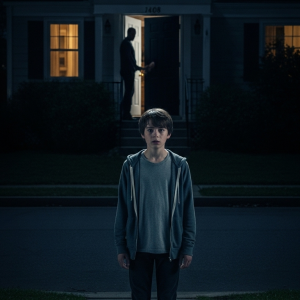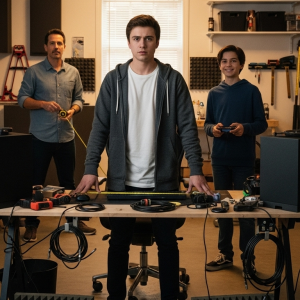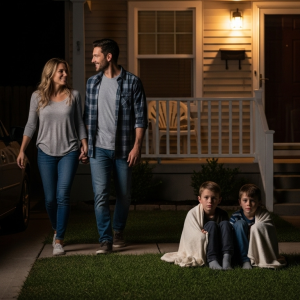From the very beginning, it was clear that I was the spare part in a family that only needed one. My twin sister, Madison, was the star of the show. With her blonde hair, green eyes, and perfect dimples, she was the angelic child everyone gushed over. When people met us, the reaction was always the same: “Oh, she’s just gorgeous!” followed by a cursory glance in my direction, “…and that’s her brother.”
My parents, Steve and Sydney, soaked up the adoration. If Madison so much as burped politely, she was praised for her grace. If I did anything, I was lazy, unmotivated, or a problem. One Christmas, she received a new iPad; I received a pack of clearance-rack socks that were two sizes too small.
They loved pointing out our physical differences. She inherited my mother’s fair skin and my father’s light eyes. I, with my darker features, didn’t quite fit their desired family photo aesthetic. I was the child frequently told, “Stand in the back, Jacob, so the lighting doesn’t wash out your sister’s face.”
Growing up, I was the designated errand boy, the built-in helper. If the garage needed cleaning, it was my job. If it was Madison’s turn to do the dishes, she suddenly had too much homework, so I did them. On family trips, I was invited along primarily to carry luggage and take pictures of everyone else having fun. The most telling insult was the photos I was never allowed to be in. They would take two versions of every portrait: one with the “perfect” family, and one with just Madison. My version simply didn’t exist.
The day they officially decided they were done with me was almost comical in its pettiness. I was twelve years old. At an upcoming school recital, I refused to wear the itchy, ill-fitting suit my mother had chosen for me. I simply said it was uncomfortable and asked to wear something else. That was my crime.
My mother had a full meltdown. My father accused me of being ungrateful and intentionally embarrassing the family. The next thing I knew, they were saying, “You know what? Maybe it’s better if you go live with your Uncle Rick and Aunt Karen for a while.” A while, it turned out, meant forever.
They didn’t even hide the reason. A week later, hiding just out of sight, I overheard my mother on the phone with a relative. Her words were cold, clear, and they burned themselves into my memory. “It was a difficult choice,” she said, her voice devoid of emotion, “but we decided to keep the better child.”
Uncle Rick, my dad’s brother, and his wife, Aunt Karen, were stunned but didn’t hesitate. They weren’t wealthy, but they were fundamentally decent human beings. When they picked me up, the contrast was immediate. They promised me my own room, my own space, and that I would never be treated like baggage again.
My parents barely said goodbye. Madison waved from the porch as if I were heading off to summer camp. The last thing my mother said to me was, “Don’t cause them as much trouble as you caused us.” No hug. No “we’ll miss you.” Just one final jab to remember them by. That night, for the first time in my life, I felt what it was like to be part of a family, not just an accessory to one.
Living with Rick and Karen was like stepping into a different reality. They asked me questions. They cared about my day. They didn’t compare me to Madison. It was the best thing that could have happened to me, but my biological family wasn’t content to simply let me go. They needed to remind me, from a distance, that I was the reject.
The first Christmas, a glossy photo card arrived. It featured my parents, Madison, and a new golden retriever I’d never seen, all in matching sweaters. The front read: “Merry Christmas from our Perfect Family!” Inside, a handwritten note in Sharpie said, “You’d look better in this picture if you tried harder.”
The harassment became a bizarre, scheduled campaign. On my fourteenth birthday, a box arrived containing a single, unfrosted cupcake with a candle jammed in it. Another time, an envelope held my burnt third-grade participation ribbon. The pettiness was breathtaking. It wasn’t about reconnecting; it was about ensuring I never forgot I was the one they’d thrown away.
The weirdest stunt was a flash drive they mailed me. I foolishly plugged it in, and my screen was filled with a slideshow of Madison’s achievements—school awards, vacation photos, sports trophies—all set to cheesy inspirational music. I couldn’t help but laugh at the sheer absurdity of it.
Then, at fifteen, it escalated. I came home from school to find a large, framed portrait left on the porch. It was their updated family photo, just the three of them and the dog. Taped to the inside of the glass, in the corner, was a tiny baby photo of me with a red X drawn through it.
The final straw came a few months later. A heavy package arrived. Inside, under layers of wrapping, was a shoebox filled with dirt and trash. On top lay a simple, handwritten note: “This is all you’ll ever be worth to us.”
Rick nearly called the police, but I told him not to bother. I didn’t want them to have the satisfaction of a reaction. But that was the day I made a decision. I wouldn’t just cut them off. I would start keeping receipts. Every petty card, every insulting note, every bizarre stunt was carefully documented and stored away for a day I knew would eventually come.
Years passed in blissful silence after I changed my number and locked down my personal information. I almost believed they had finally forgotten about me. But people like my parents and Madison don’t reach out because they miss you. They reach out because they need something.
So, when Madison’s name flashed on my phone screen, I knew it was bad news. Curiosity got the better of me. I answered, bracing myself for the performance.
Her voice was syrupy sweet, dripping with a fakeness I remembered all too well. “Jacob! Hey! It’s been forever. How are you?”
I played along. “Let me guess. This call ends with you asking for money.”
She laughed, a tinkling, artificial sound. “Oh, stop! Seriously, though, I’ve been thinking about you. We should catch up.” After two minutes of awkward small talk, she went in for the kill.
“So,” she said, her voice turning casual, “I heard Uncle Rick got some money from Grandma and Grandpa’s estate.”
Bingo.
“They left a trust in my name that Rick managed,” I said, my tone flat. “He transferred it to me a few months ago. It’s mine now.”
“Well,” she purred, “I was just thinking… you know, since we’re twins and all, it would only make sense to split it.”
I laughed out loud. I couldn’t help it. “Split my inheritance? That’s cute.”
Her sweet demeanor vanished instantly. “I’m serious, Jacob. We’re family. Family shares.”
“Funny,” I said, my jaw tightening. “You didn’t seem interested in sharing when I had to eat dinner alone in the kitchen so you and your friends could have the dining room.”
“God, you’re so dramatic,” she snapped, her voice turning sharp. “This is about doing the right thing. I need this money for college.”
“You mean the college you could have paid for with the fund Mom and Dad set up for you?” I countered. “The one you blew on designer handbags and a trip to Italy? A cousin told me all about it.”
There was a stunned silence on the other end. That had landed. “That was different!” she finally spat. “I was living my life! You’ve had it easy with Rick and Karen. You don’t even need all that money!”
“Let me get this straight,” I said, the absurdity of it all making me smile. “You waste your own college fund, and now you think you’re entitled to mine? Because I had the ‘easy life’ with the people who actually wanted me?”
“If you’re not going to do the right thing,” she threatened, “then maybe Mom and Dad should talk to you.”
“Go for it,” I said, enjoying this far too much. “I haven’t spoken to them in years. It should be fun.” Then I hung up.
Within 48 hours, my phone was blowing up with calls and texts from my parents and distant relatives, all reciting the same script: It’s your duty to help your sister. Madison even started a GoFundMe with the title, “Help me get to college; my wealthy brother won’t help.” The page featured a picture of her standing next to her BMW. The entitlement was Olympic-level. I wasn’t angry anymore. I was impressed. And I knew she had just handed me the perfect weapon.
Instead of blocking them, I decided to lean into the chaos. I let them think they were wearing me down, all while I gathered my ammunition. They sent me spreadsheets detailing Madison’s proposed “college budget,” which included a $7,000 wardrobe refresh and a $9,800 “transportation upgrade.” I saved every file.
A friend sent me screenshots of Madison’s private social media, where she was bragging about recent shopping sprees and a weekend trip to a five-star resort. All this, while she was simultaneously texting me about how she couldn’t even afford textbooks. I saved every image.
They made their final mistake by creating a “Family Support” group chat, adding me, my parents, and a dozen other relatives.
Madison opened with: I’m reaching out so everyone can see how Jacob refuses to help his twin sister, even though he’s sitting on more than enough money to change her life.
My mother chimed in: We’re just asking for fairness. He’s been so blessed and should share with his family.
That was my cue. They had taken it public. So, I would make it permanent. I took a deep breath and began to type.
Jacob: Okay, since we’re talking openly, let’s make sure we all have the same information. Here is Madison’s full “college” budget request. I attached the color-coded spreadsheet.
Jacob: You’ll notice only 20% is for tuition. The rest is for clothes, a new car, and my personal favorite, $5,000 for “personal wellness.” Then I dropped the photo of her new $1,200 handbag, with the price tag still visible.
My mother replied: That’s not the point, Jacob! The point is that you have been blessed!
Jacob: Speaking of blessings, here are some photos from her “self-care” trip last weekend at a five-star resort. Must be hard balancing applications and poolside mimosas. I attached the resort screenshots.
The chat went wild. Cousins left the group. An aunt sent a wide-eyed emoji. My dad tried to do damage control, but it was too late. I went for the final blow.
Jacob: And for context, here are screenshots of Madison bragging to her friends about blowing her original college fund on trips to Italy and the Maldives, along with her exact words: “It’s fine, I’ll just get Jacob to pay for the rest. He owes me anyway.”
Jacob: So, just to confirm, I owe you because our parents dumped me at Rick and Karen’s when I was 12 so they could keep the “better looking” twin? Just want to make sure I understand the logic.
The group chat descended into nuclear fallout. Relatives were messaging me privately, shocked and appalled. Madison feebly typed, You’re taking everything out of context!
Jacob: Here is the context. Madison, you’re not getting a dime. Mom and Dad, you raised her to be this entitled, and now it has blown up in your faces. To everyone else, I’m sorry you had to see this. This is the last time I will be responding to any of you. Goodbye.
Then, I left the group. Within 24 hours, her GoFundMe was deleted, flooded with comments calling her a scammer and linking to the screenshots. Her reputation within the family was destroyed. All I had to do was hand them back their own words.
I thought that would be the end of it. But a few months later, there was a sharp, desperate knock on my door. I peeked through the window and saw my parents. They looked haggard, their faces etched with a desperation I’d never seen before.
I opened the door halfway. “What brings you here?” I asked. “Forget my birthday again and want to make up for it?”
“We’ve made mistakes, Jacob,” my mother began, her hands clasped together. “But we’re still family…”
“Stop right there,” I cut her off. “The last time I heard that word from you, you were asking for money. This isn’t a social call.”
My dad finally admitted it. “We’re in a bit of a tight spot. The house… it’s in foreclosure.”
Right on cue, Madison walked up from the driveway, wearing designer sunglasses and holding an oversized coffee. “Hey, Jacob,” she said, as if greeting a waiter. “Things have been hard. You have the means to help us.”
I couldn’t help but grin. “You’re right, I do. And I’m using them for me. Crazy concept, I know.”
My dad tried to appeal to a fatherly authority he had never earned. “We’re asking for an interest-free loan.”
“No,” I said simply.
My mother tried guilt. “We took you in when you were a baby!”
“Correction,” I interrupted. “You gave me away because I didn’t match the holiday photo aesthetic. Let’s not rewrite history.”
They stood there, shifting uncomfortably, realizing their old tactics had no power here. “If we lose the house, we’ll have nowhere to go,” my mom pleaded.
“Bummer,” I replied.
They made their choice a long time ago. They picked their favorite, backed her even when she was wrong, and decided I was disposable. Now, they stood on my doorstep because they needed something from the disposable one.
“So here’s my answer,” I said, my voice calm and steady. “The same one you gave me my whole life. No.”
And with that, I shut the door.
Life after that was wonderfully quiet. Until the universe decided to give me an encore.
I was at a steakhouse with friends on a Friday night. On my way to the restroom, I walked past the kitchen entrance and saw a flash of a familiar face. It was Madison. Her hair was pulled back in a messy bun, and she was wearing a faded blue janitor’s uniform, mopping the floor.
I froze for a second, and then a laugh erupted from my chest—pure, unadulterated, and unstoppable. She looked up, and her face went pale with horror.
“Oh my god,” she muttered, trying to turn away.
“No, no, don’t hide,” I said, pulling out my phone. “Blue really suits you. Just one for the family album.” Click.
“Delete that!” she hissed, but I was already snapping more photos.
“Come on, sis,” I said, grinning. “This is perfect. We can put it next to the picture of you holding that ‘Need Money?’ sign.”
Her jaw clenched. A few other patrons glanced over, intrigued. I gave them a little shrug and stage-whispered, “Family reunion. She’s in her work clothes.”
Madison’s face flushed crimson. She abandoned her mop and bucket and practically sprinted through the swinging kitchen doors. I took one last picture of the lonely mop bucket and went back to my table.
I sent the photos to a few cousins. By the time I got home, a side-by-side meme was already making the rounds. On the left: Madison posing in Italy. On the right: Madison in her janitor uniform. The caption: “Living the life she deserves.”
What my family never understood was that this wasn’t just about revenge. It was about reality. Madison had spent her entire life convinced someone would always be there to save her. Seeing her in that uniform, knowing there was no rescue coming, was better than any apology she could have faked. It was the perfect ending to a story they had written long ago. They had picked the better child, and in the end, they were both left with nothing.




